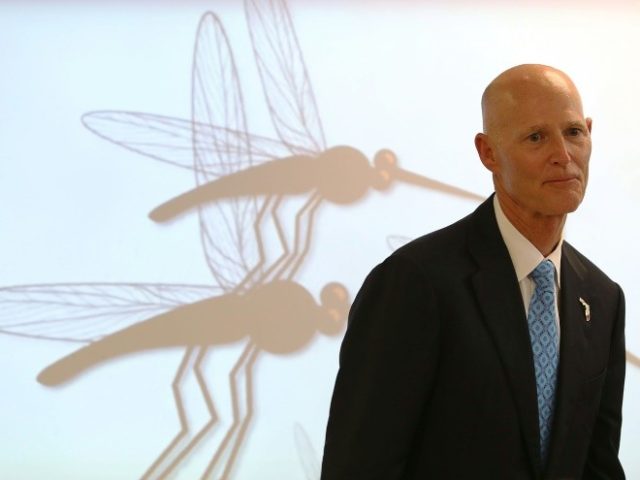Florida officials announced Tuesday that a case of locally-acquired Zika infection has been confirmed in the Tampa Bay Area, as medical officials document 42 such cases in the Miami-Dade area, nearly 300 miles away.
Governor Rick Scott confirmed a case of Zika infection in Pinellas County, part of the Tampa Bay area, but has not identified the individual or the neighborhood in which the infection occurred. They are expected to deliver a more thorough report on the location of this new infection following research throughout Pinellas County to identify the potential location of the mosquito nests responsible. The person, which was identified only as a woman, did not travel outside the county, and medical officials believe she contracted the virus through a mosquito bite.
“This person did not travel to an infected area with Zika; we are looking at a number of locations. Hopefully something good will happen and it will just be a single case. But if we do find out, what we will do is we will be very aggressive,” Scott said, according to the Tampa Bay Times. Spraying some areas of Tampa Bay with insecticide has begun to occur, though a more thorough campaign may follow as information surfaces.
Doctors are warning, despite the lack of official government action in Pinellas County, that pregnant women in particular practice safe sex to avoid contracting Zika through their partners. “Until we can narrow down with great precision the neighborhoods infected, we have to assume every pregnant woman is at risk in Pinellas and Hillsborough until you can say it’s a specific neighborhood,” Dr. Charles Lockwood, dean of the Morsani College of Medicine at the University of South Florida, told the Miami Herald.
Dr. Celeste Philip, Florida’s surgeon general, warned that new information may not be available if only one case of Zika surfaces in Tampa Bay: “When we have multiple cases, it is easier because we can often find mosquito breeding sites… But if we don’t find additional people that are positive, we may never find out where that case occurred.”
In Miami, where two neighborhoods have been put on Zika alert – the north Miami neighborhood of Wynwood and a section of Miami Beach – the number of locally-acquired Zika cases is currently at 42, according to Tuesday’s Tampa Bay Times. Authorities claim the Wynwood area is once again safe after the U.S. Centers for Disease Control (CDC) declared it a risk center and warned against non-essential travel to the area.
In Miami Beach, Mayor Philip Levine has also declared the risk over. “We have contained the small little outbreak of Zika, which was very limited. One section of Miami — it wasn’t Miami Beach,” Levine told New York radio host John Catsimatidis earlier this week.
The assurances appear to have done little to curb the fears of pregnant women in affected areas. “Patients are very anxious, and they bring up the subject of Zika with me before I even get a chance. Before, this was an ocean away. Now it’s in their backyard,” Dr. Elizabeth Etkin-Kramer, who practices in south Florida, tells the Tampa Bay Times. Pregnant women tell the newspaper they are avoiding going outside when possible and cover their bodies entirely when they must.

COMMENTS
Please let us know if you're having issues with commenting.